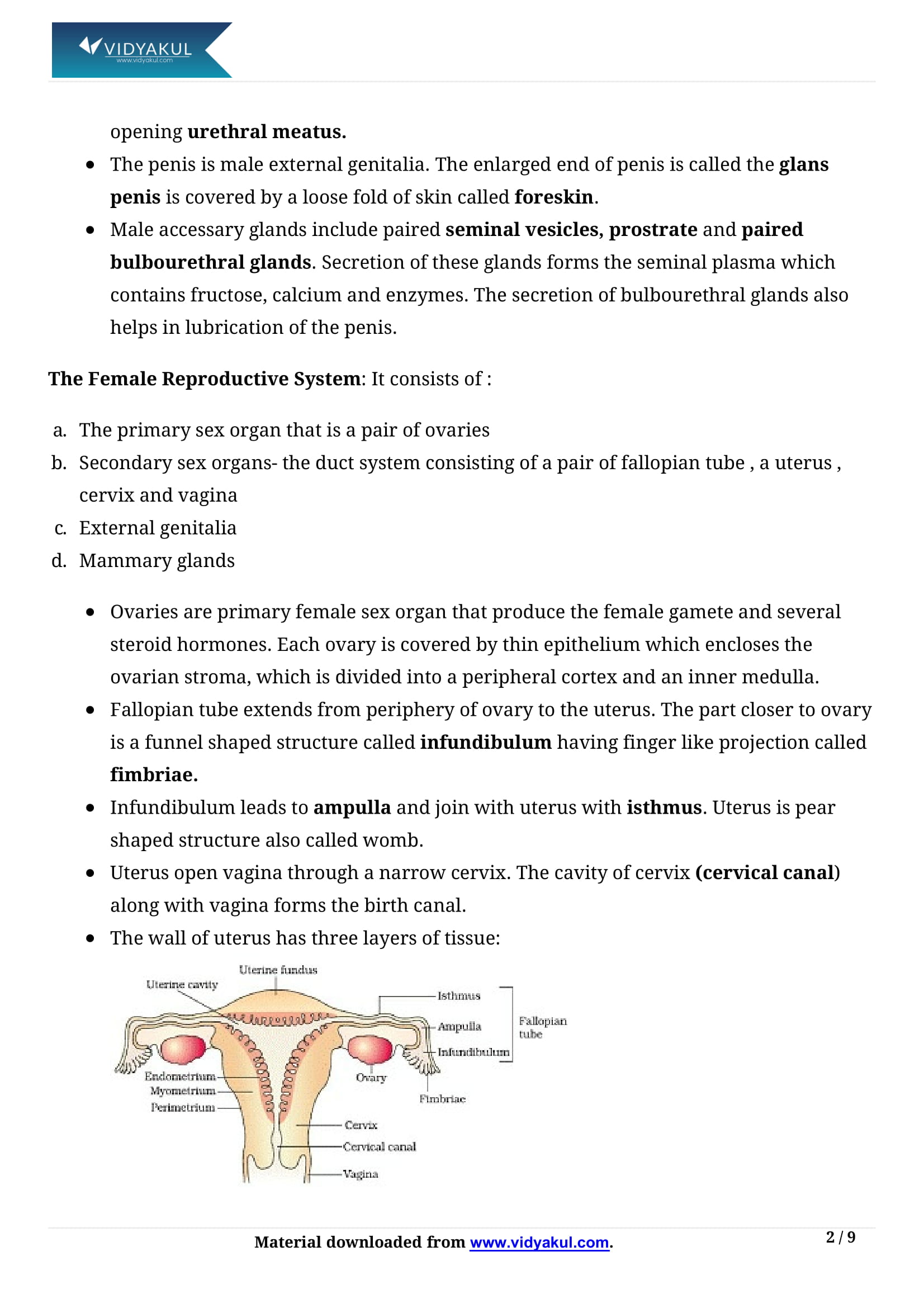Human Reproduction Class 12 Notes

Chapter 3 Human Reproduction
Human Reproduction is an important and comprehensive chapter in Grade 12 Biology. Notes provided by Vidyakul for Chapter 3 Biology Grade 12 include explanations for the questions in the text. In this chapter, students will learn about gametogenesis, the male reproductive system, pregnancy and embryonic development, the female reproductive system, lactation, childbirth, fertilization, implantation, and the menstrual cycle.
CBSE CLASS 12th BIOLOGY CHAPTER-3
Points to Remember
Below we have provided some of the important points to remember to ace your exam:
Human beings reproduce sexually and are viviparous, and it becomes fully active during puberty.
For males, the reproductive system consists of a pair of testes, accessory glands, a duct system, and a penis.
For females, the reproductive system consists of the ovaries, fallopian tubes, uterus, uterine cervix, vagina, accessory genital glands, external genitalia, and mammary glands.
Spermatogenesis refers to the production of sperm in the testis, and oogenesis refers to the production of ova in the ovary.
Ovulation and ovarian hormone secretion are cyclic processes that occur during the menstrual cycle.
When sperms fertilize the ovum following sexual contact, they are transported to the junction between the isthmus and ampulla.
Topics and Sub-topics
Below we have provided some of the important points to remember to ace your exam:
Human beings reproduce sexually and are viviparous, and it becomes fully active during puberty.
For males, the reproductive system consists of a pair of testes, accessory glands, a duct system, and a penis.
For females, the reproductive system consists of the ovaries, fallopian tubes, uterus, uterine cervix, vagina, accessory genital glands, external genitalia, and mammary glands.
Spermatogenesis refers to the production of sperm in the testis, and oogenesis refers to the production of ova in the ovary.
Ovulation and ovarian hormone secretion are cyclic processes that occur during the menstrual cycle.
When sperms fertilize the ovum following sexual contact, they are transported to the junction between the isthmus and ampulla.
Frequently Asked Questions
What are the main parts of the male reproductive system?
The male reproductive system includes the penis, scrotum, testes, epididymis, vas deferens, prostate, and seminal vesicles.
What are the main parts of the female reproductive system?
The main parts of the female’s internal reproductive organs are the vagina, uterus, fallopian tubes, cervix, and ovary.
What are ‘Gametes’?
Gametes are an organism’s reproductive cells. They are also referred to as sex cells. Female gametes are called ova or egg cells, and male gametes are called sperm.
Practice Questions
What are the three stages of parturition?
What happens during spermatogenesis?
Describe the structure of a male reproductive system?
What is the role of sex hormones in the human reproductive system?
Explain in detail about the female reproductive system with a neat labeled diagram?
Human beings reproduce sexually and are viviparous, and it becomes fully active during puberty.
For males, the reproductive system consists of a pair of testes, accessory glands, a duct system, and a penis.
For females, the reproductive system consists of the ovaries, fallopian tubes, uterus, uterine cervix, vagina, accessory genital glands, external genitalia, and mammary glands.
Spermatogenesis refers to the production of sperm in the testis, and oogenesis refers to the production of ova in the ovary.
Ovulation and ovarian hormone secretion are cyclic processes that occur during the menstrual cycle.
When sperms fertilize the ovum following sexual contact, they are transported to the junction between the isthmus and ampulla.
Human beings reproduce sexually and are viviparous, and it becomes fully active during puberty.
For males, the reproductive system consists of a pair of testes, accessory glands, a duct system, and a penis.
For females, the reproductive system consists of the ovaries, fallopian tubes, uterus, uterine cervix, vagina, accessory genital glands, external genitalia, and mammary glands.
Spermatogenesis refers to the production of sperm in the testis, and oogenesis refers to the production of ova in the ovary.
Ovulation and ovarian hormone secretion are cyclic processes that occur during the menstrual cycle.
When sperms fertilize the ovum following sexual contact, they are transported to the junction between the isthmus and ampulla.
What are the main parts of the male reproductive system?
What are the main parts of the female reproductive system?
What are ‘Gametes’?
What are the three stages of parturition?
What happens during spermatogenesis?
Describe the structure of a male reproductive system?
What is the role of sex hormones in the human reproductive system?
Explain in detail about the female reproductive system with a neat labeled diagram?
Learn more about the same in Human Reproduction Class 12 Notes pdf.
Download this solution for FREE Download this PDF
Download Vidyakul App for more information and free video lectures.




